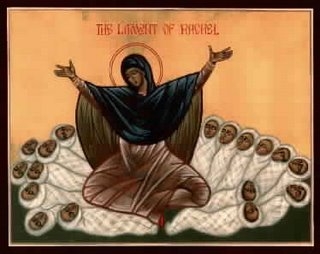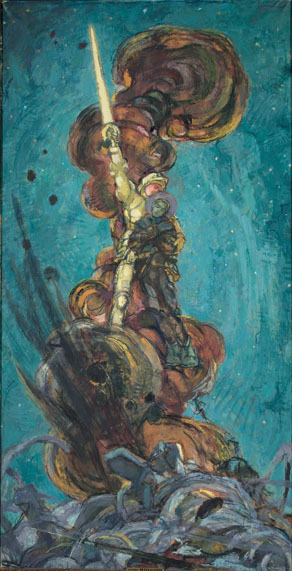Wonderful
site, lately I'm discovering all sorts of marvels that have been around, but I missed though my careless searching skills.
Look at this, a perfect Memorial Day, or Remembrance Day object for meditation and really, devotion.
Oh, hell, perfect today as the entire world is contemplating war, and the possible justice of it.
It's not a style I think I have encountered in Church, (nor would I this painting, it is located in a museum, I believe,) but it would not be out of place in a chapel, I think.
Where was it, Cardiff? where the cathedral, (C of E,) had great variety in its decoration, ornament and embellishment, much of which co-existed in a way likely to excite top prayer, and some of it just.... well, Jesus on a Spaceship was jarring, beyond ugly.
But I have been doing a bit of soul-searching about beauty and pleasure in regard to the art of the Faith.
I want my positions to be principled, not preference-based.
Someone wants us to help the kids "make their own Mass," and I interrupted to disagree a little too precipitously... okay, a lot too precipitously.
Maybe rudely.
Of course the entire notion of "creating" the Liturgy, rather than receiving it is problematic, and I don't think the person doing the suggesting knew enough about the subject to be aware of that.
The message that even talking in such terms send is dangerous.
But I'm also cognisant that the Mass should be "attractive" and different people are attracted by different expressions of beauty.
Here's the thing -- say you're a searcher, a lurker, a fallen-away, a youthful rebel, whatever....
Say you are not a regular, committed believer.
And say something is designed with bringing you in to Mass in mind.
The art, whether visual or musical or oratorical, that lures you in to the Holy Sacrifice of the Mass
must then convince you, not to like
it, not to say to yourself,
wow, I'd come to hear/see this again.
It must help convince you that you can do without it, that even in the complete
absence of what you "like", even in the presence of something that you hate, that actively repels you -- that even then, the Mass itself is something you can not do without, that you will not let your preferences deprive you of it, that you would come no matter what.
If it doesn't point you towards this truth, that the Mass is so important, so life-giving, so
necessary -- that even with having to tolerate the My Little Pony Mass, or the world's ugliest felt banners, or the priest who thinks he's auditioning to replace Seth McFarland on Comedy Central's roasts, or a choir singing dismally flat Gregorian chant, or a neighboring pew sitter with B.O., or the loudest drummer in seventeen states assaulting -- even then, you must have it, you must go, you cannot do without the Mass, the
Mass itself. -- if it doesn't form you such that you would forgo your preferred music or style rather than forgo the Mass, that you would brave things you despise and hurt your head and make your teeth itch in order to have the Mass, then it is bad and inappropriate, no matter how much you "like" it.
And not just the Mass, but the part of it, the essence of it that you can get there and only there, you must be brought to understand and believe fervently that you would put up with anything in order to have that aspect of it.
And that is why, since fellowship, music, preaching, even -sorry, but I have come to believe this - even the scripture readings, since all of that is something you can get or do somewhere else - if any of those don't point you toward Christ in the Blessed Sacrament, they are useless, worse than useless, they are a distraction.
And for too long, Catholics have been acting as if we were Tiffany's trying to lure in custom with "Free Coffee and Donuts!"
We have a precious jewel, and we've been shrieking like barkers, and passing out popcorn.
Christ in the Eucharist is that precious jewel, the Pearl of Great Price for which we should be willing to do and dare anything.
And we cannot have Him so completely, so intimately any other way.









